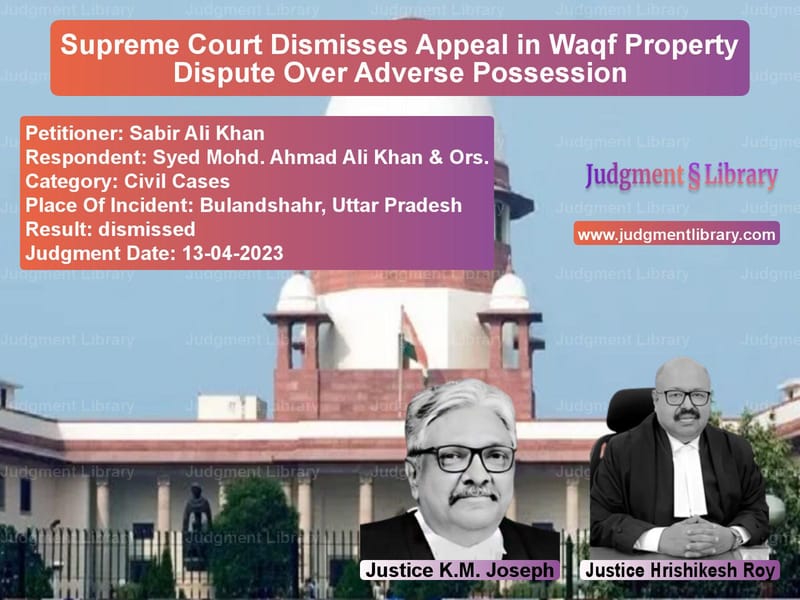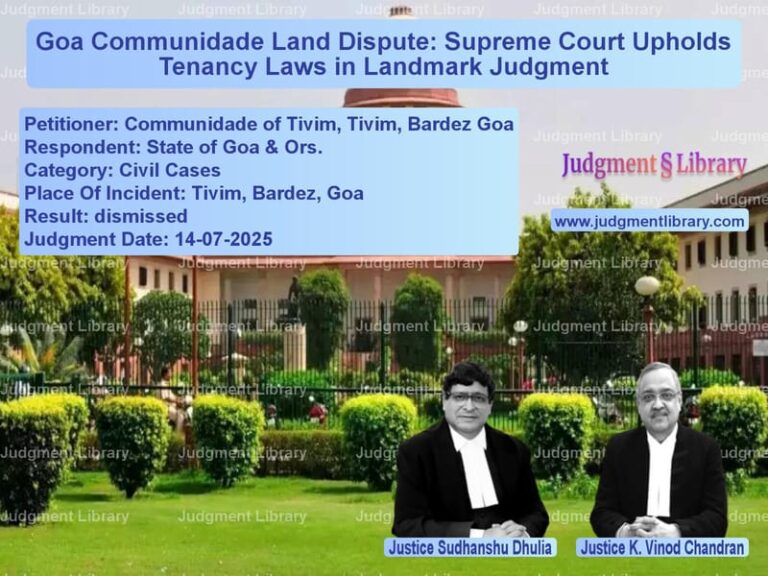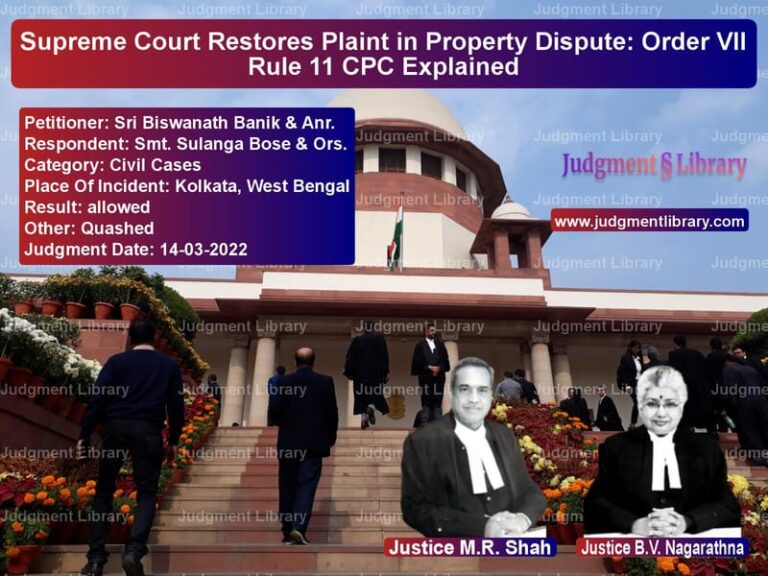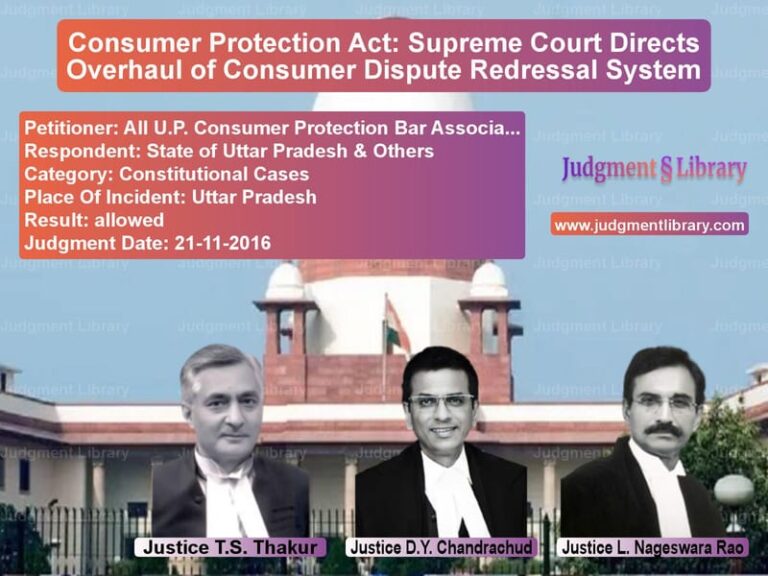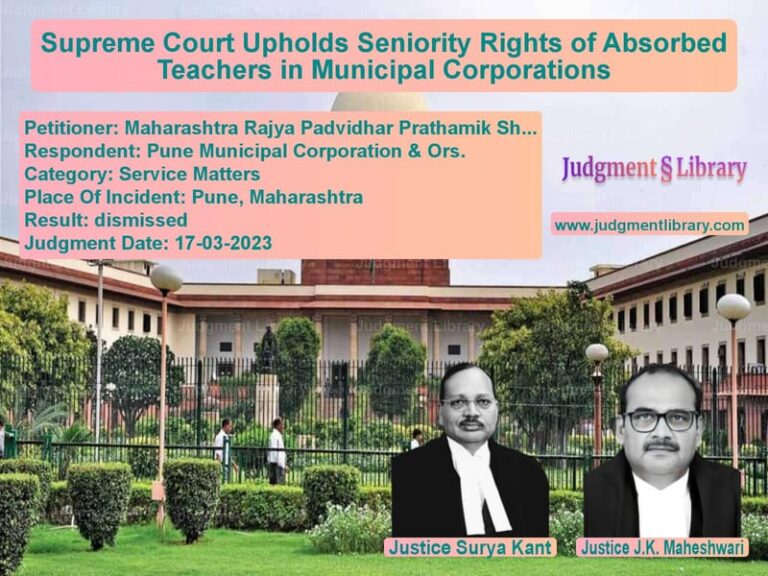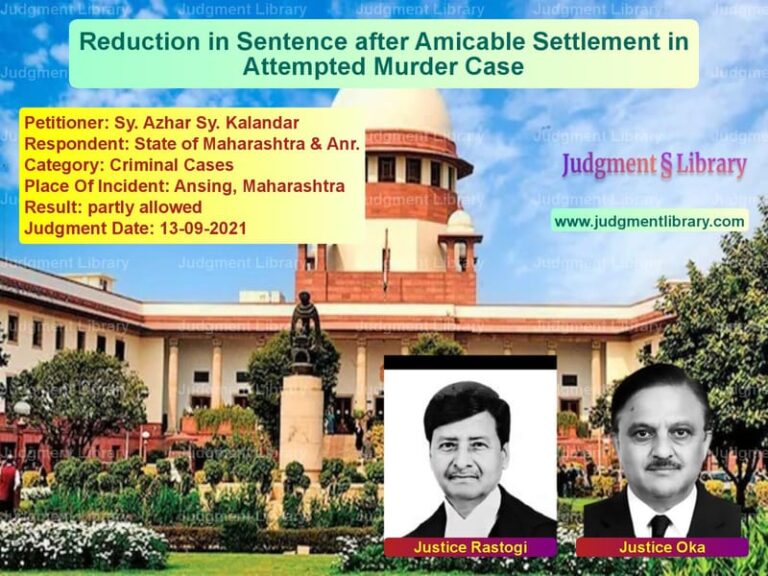Supreme Court Dismisses Appeal in Waqf Property Dispute Over Adverse Possession
The Supreme Court of India recently delivered a significant ruling in the case of Sabir Ali Khan vs. Syed Mohd. Ahmad Ali Khan & Ors., addressing a long-standing dispute over waqf property rights, adverse possession, and the applicability of the Limitation Act to waqf properties. The case revolved around whether a beneficiary of a waqf could claim ownership through adverse possession and whether statutory provisions limiting the transfer of waqf properties applied to transactions conducted decades ago.
Background of the Case
The case stemmed from a dispute over a waqf-alal-aulad (family waqf) created by Mohd. Akbar Ali Khan in 1934. The waqf covered substantial land in Uttar Pradesh, and disputes arose over its ownership and management after Akbar Ali Khan’s death in 1958. His son, Qasim Ali Khan, became the mutawalli (custodian) of the waqf.
Over the years, conflicting transactions took place:
- In 1960, one of Akbar Ali Khan’s sons, Kazim Ali Khan, transferred a portion of the waqf property to Mohd. Ahmad Ali Khan (his nephew).
- In 1974, Qasim Ali Khan, as mutawalli, executed another sale deed, transferring a one-third share of the waqf property to Syed Mohd. Ali Khan.
- These transactions took place despite the U.P. Muslim Waqf Act, 1960, which required prior approval from the Waqf Board for any sale of waqf property.
The dispute intensified when Sajjad Ali Khan, a descendant and claimant to the waqf, challenged these transfers, arguing that the sales were void under waqf law.
Legal Journey
Waqf Tribunal’s Findings
The Waqf Tribunal examined the case and ruled:
- The sales conducted in 1960 and 1974 were illegal under waqf law, as they lacked prior approval from the Waqf Board.
- Despite this, the buyers had acquired ownership through adverse possession—having remained in uninterrupted possession for over 12 years.
- The Tribunal dismissed the claim that waqf property could not be subject to adverse possession.
High Court’s Observations
The High Court upheld the Tribunal’s findings, ruling:
- Although waqf property is vested in the Almighty, beneficiaries are not treated as trustees and can claim ownership through adverse possession.
- Under Article 65 of the Limitation Act, 1963, adverse possession begins from the date of sale.
- As the sales occurred in 1960 and 1974, the 12-year period expired in 1972 and 1986, respectively—before the enactment of the Waqf Act, 1995.
- The bar on adverse possession under Section 107 of the Waqf Act, 1995, did not apply retrospectively.
Supreme Court’s Ruling
The Supreme Court, comprising Justices K.M. Joseph and Hrishikesh Roy, upheld the High Court’s decision and dismissed the appeal.
Key Observations:
- “Once a waqf, always a waqf” is a principle of Islamic law, but it does not override the Limitation Act.
- A mutawalli cannot claim adverse possession over waqf property, but a beneficiary can.
- The transactions in question were void under waqf law, but possession continued uninterrupted for over 12 years.
- The Tribunal’s findings on adverse possession were correct, and the claim to recover possession was barred by limitation.
Implications of the Judgment
This ruling has several legal implications:
- Adverse Possession of Waqf Property: The case reaffirms that while mutawallis cannot claim adverse possession, beneficiaries and third parties can.
- Finality of Illegal Sales: Even though waqf properties are deemed inalienable, long-standing possession under void transactions can lead to ownership.
- Time Bar on Waqf Claims: The Waqf Board and claimants must act within the statutory limitation period to challenge illegal transactions.
- Non-Retroactivity of the Waqf Act, 1995: The bar on adverse possession introduced in 1995 does not apply to cases where possession had already matured into ownership.
Conclusion
The Supreme Court’s ruling in Sabir Ali Khan vs. Syed Mohd. Ahmad Ali Khan & Ors. clarifies the legal position on adverse possession concerning waqf properties. While waqf properties are generally protected from unauthorized transfers, the Court confirmed that long-standing possession, even under void transactions, can lead to ownership. This ruling underscores the importance of timely legal action by waqf authorities to prevent unauthorized alienation of waqf assets.
Petitioner Name: Sabir Ali Khan.Respondent Name: Syed Mohd. Ahmad Ali Khan & Ors..Judgment By: Justice K.M. Joseph, Justice Hrishikesh Roy.Place Of Incident: Bulandshahr, Uttar Pradesh.Judgment Date: 13-04-2023.
Don’t miss out on the full details! Download the complete judgment in PDF format below and gain valuable insights instantly!
Download Judgment: sabir-ali-khan-vs-syed-mohd.-ahmad-ali-supreme-court-of-india-judgment-dated-13-04-2023.pdf
Directly Download Judgment: Directly download this Judgment
See all petitions in Property Disputes
See all petitions in Succession and Wills
See all petitions in Landlord-Tenant Disputes
See all petitions in Judgment by K.M. Joseph
See all petitions in Judgment by Hrishikesh Roy
See all petitions in dismissed
See all petitions in supreme court of India judgments April 2023
See all petitions in 2023 judgments
See all posts in Civil Cases Category
See all allowed petitions in Civil Cases Category
See all Dismissed petitions in Civil Cases Category
See all partially allowed petitions in Civil Cases Category

